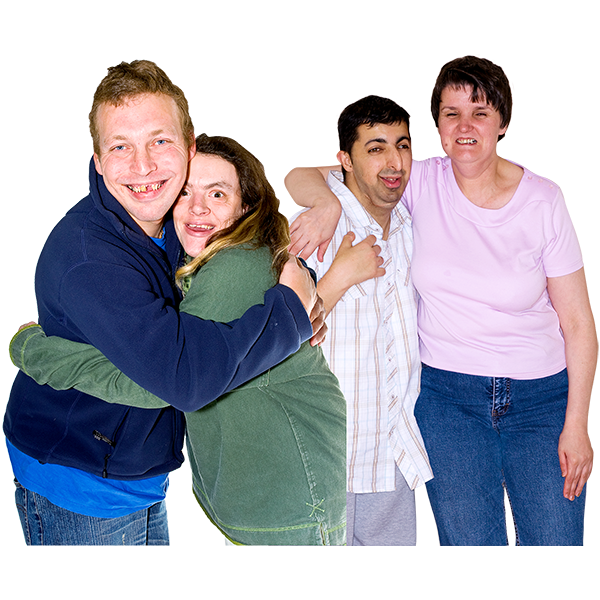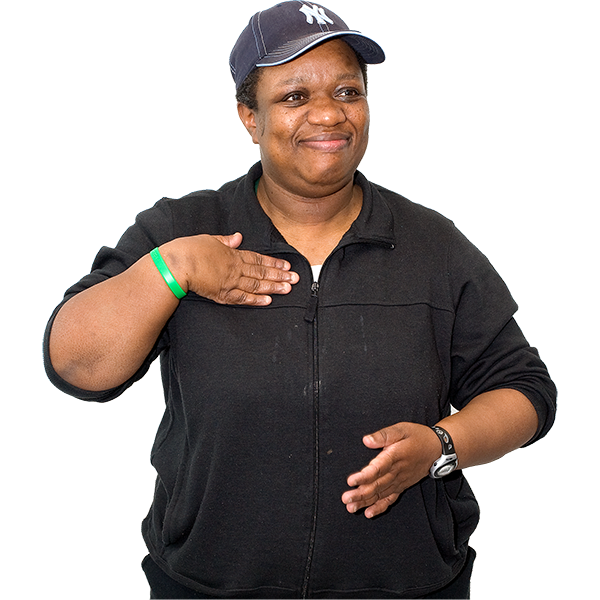What do we mean by storytelling?
In this context, ‘storytelling' is about people being able to express their feelings and emotions and being given the time and space to tell their own story to trusted carers and family.
We have made a video which explains what people with a
learning disability
 A learning disability is to do with the way someone's brain works. It makes it harder for someone to learn, understand or do things.
think about storytelling.
A learning disability is to do with the way someone's brain works. It makes it harder for someone to learn, understand or do things.
think about storytelling.
Over a period of three years we conducted a deep dive into the importance of storytelling
From 2017-2020, through 'Our Social Networks', we collected stories from people with a learning disability. We listened to recordings of these stories and analysed 25 transcripts in depth to understand the importance of friendships and
relationships
 Relationships are about the people in your life. You might have different types of relationships like friendships, family relationships, or a boyfriend or girlfriend.
for people with a learning disability.
Relationships are about the people in your life. You might have different types of relationships like friendships, family relationships, or a boyfriend or girlfriend.
for people with a learning disability.
Our storytelling research told us that:
- friendships and relationships are vital to us having a good life;
- friendships and relationships give us a sense of validation and pride;
- friends help us to make sense of ourselves and our life events;
- it is important to have a shared history with another person beyond our family; we all need companionship.
However, the stories we heard also highlighted:
- How difficult friendships and intimate relationships continue to be for many people with a learning disability.
- For many people with a learning disability, their social networks revolve exclusively around family and staff.
- The lack of power that many people with a learning disability have over their friendships and relationships.
- That many people feel they need to seek approval or even permission to make decisions about their friendships and relationships.
- That within social care, safeguarding and protection often overshadows people’s
rights
 Rights are the things everyone should be allowed to do like have a say, or go to school.
, particularly in respect to intimate relationships.
Rights are the things everyone should be allowed to do like have a say, or go to school.
, particularly in respect to intimate relationships. - There are often barriers within service provision around processes and resources.
- That friendships and relationships are viewed as an added extra - something that would be lovely but not the core business of support and certainly not the core role of support staff.
- That current Relationships and
Sexuality
 Sexuality is how you feel about yourself and your body. It is about finding out and knowing what feels right for you.
Education
Sexuality is how you feel about yourself and your body. It is about finding out and knowing what feels right for you.
Education
 Education is when you learn things. When you fill in a form to get a job, education means you write where you went to school, college or university.
is not adequate.
Education is when you learn things. When you fill in a form to get a job, education means you write where you went to school, college or university.
is not adequate. - Organisational approaches to relationships and sexuality are often reactive and ad hoc.
- That many people have experienced bullying, particularly in school, and often do not feel accepted or safe in mainstream environments. Many described only finding this acceptance by accessing specific learning disability groups.
- How people need proactive support to find and develop friendships and relationships.

Learnings from our research about the importance of storytelling
- For us to connect with others we need to have an understanding and trust in ourselves. Friendships and relationships cannot be understood without consideration of identity, self-worth, agency, and power.
- Supporting something in principle alone is not enough. The facilitation of friendships and relationships requires the same level of attention and work that we invest in other areas –
employment
 Employment means having a job.
for example.
Employment means having a job.
for example. - We have sought to identify some practical recommendations and recognise that what is required is a shift in mindset and approach that positions friendships and relationship as a fundamental right and core to social care. We understand that the practical suggestions in our recommendations relate to processes and that changes to them alone will not secure this cultural shift.
- We understand the capacity of support staff to build trusting relationships with the people they support will depend on how much control they have and how valued they feel at work. In practice, this means staff need to feel they are paid fairly and trust that their voice and ideas are heard. If staff feel they are supported to flourish they are in a better position to create relationships based on trust with people with a learning disability.

If someone says they would like a friend or partner but do not have one, we should all be asking ‘why?’"
Our recommendations
We have made a downloadable resource of our recommendations following our extensive storytelling research which we hope will be used as a starting point for discussion and debate.
These recommendations are intended to inform practice across organisations, but also prompt conversations with staff and people with a learning disability and their families.






